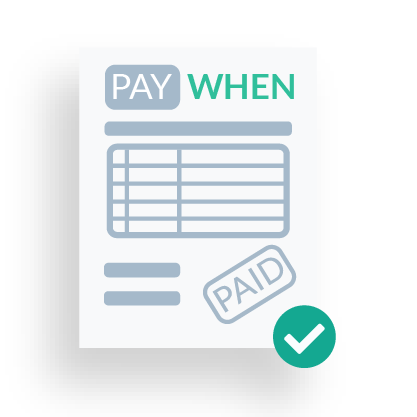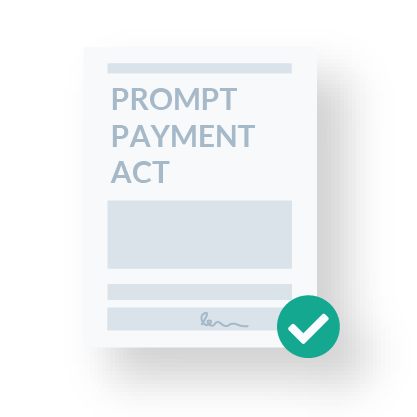Arizona Construction Contracts
- Private Jobs
- Public Jobs
- Top Links

Lien Rights Can't Be Waived by Contract
Arizona statutes specifically prohibit the ability to waive lien rights by contract.
Pay-If-Paid is Enforceable
Pay if paid clauses can be valid and enforceable in Arizona, provided that the clause sets forth that the clause is a specific "condition precedent" to payment. Note, however, that the clause is unenforceable when payment is not made due to gross mistake or fraud.

Pay-When-Paid is Enforceable
When unambiguous, a pay when paid provision in Arizona can be enforced as a pay-if-paid clause sufficient to bar payment. However, any ambiguously worded clause is treated as a mere timing mechanism such that payment must ultimately be made.

Payment Timing May Be Modified By Contract
The timing requirements on private construction projects under the prompt payment laws may be modified by the terms of the contract.

Retainage Mostly Unregulated
Arizona has some laws about retainage, but the amount of retainage withheld is unregulated. Contractors can withhold any "reasonable" amount of retainage.
Pay-If-Paid Is Enforceable
Pay if paid clauses can be valid and enforceable in Arizona, provided that the clause sets forth that the clause is a specific "condition precedent" to payment. Note, however, that the clause is unenforceable when payment is not made due to gross mistake or fraud.

Pay-When-Paid is Enforceable
When unambiguous, a pay when paid provision in Arizona can be enforced as a pay-if-paid clause sufficient to bar payment. However, any ambiguously worded clause is treated as a mere timing mechanism such that payment must ultimately be made.

Payment Timing to Subs/Suppliers May Be Modified By Contract
Payments by the public entity must be made within 14 days of approval. All other payments can be made within 7 days of receipt of payment; unless otherwise agreed.

10% Maximum Retainage Cannot Be Modified
Retainage on public projects can no more than 10%, upon 50% completion, retainage may be reduced to 5%.
A construction contract outlines each party’s obligations, rights, and remedies on a project. But although the language in specific contract clauses is typically negotiable, Arizona has certain rules that govern what the agreement must include — and what is prohibited.
Keep in mind that, while Arizona’s rules for construction contract terms are written into state law, the courts determine how strictly those laws should be interpreted — and those interpretations can change.
On this page, you’ll find resources, legal information, and answers to frequently asked questions about Arizona’s construction contract and payment terms requirements.
Arizona construction contract provisions
While Arizona generally allows construction parties to set the terms of their agreement, there are some laws that regulate specific types of contract provisions. Any contract clause that contradicts the law is invalid and unenforceable.
“No lien” clauses
Arizona’s mechanics lien law specifically prohibits the use of “no-lien clauses.” Any term in a construction contract that attempts to waive or impair a party’s claims or liens, shall be void and unenforceable.
Contingent payment clauses
There are two types of contingent payment clauses: pay-if-paid and pay-when-paid.
Both of these clauses are enforceable in Arizona. However, in order to be a valid and enforceable pay-if-paid clause in Arizona, it must clearly state that payment from the owner is a condition precedent to payment, payment isn’t due until the owner has paid, and identifies owner payments as the sole source of funding of the subcontract. If these conditions aren’t met, or the clause is deemed to be ambiguous, it will be treated as a pay-when-paid clause, requiring a reasonable time for payment.
Payment timing clauses
Arizona’s prompt payment provisions govern the timing of payments on both private and public projects. On private projects, the timing of payments from the owner to the prime contractor may be modified by the contract, as long as the specific statutory notice language is included. All other payments must be made according to the statute.
Conversely, on public projects, payments by the contracting public entity must be made according to the statute. But all other payment deadlines under the public prompt pay laws may be modified by the terms of the subcontract.
Retainage limits
Arizona laws only regulate the amount of retainage withheld on public projects; at no more than 10%, until 50% completion. If successful progress is being made, the amount will be reduced to no more than 5% of the remaining progress payments. This may not be altered by contract. As far as retainage on private projects, there is no cap on the amount that can be withheld. So the amount of retainage withheld will be determined by the terms of the contract itself.
Arizona construction contract requirements
All prime construction contracts in Arizona over $1,000 must include certain pieces of information and provisions in order to be valid. This includes the contractor’s name, business address, and license number, as well as a description of work to be performed, the total contract price, and an estimated date of completion; amongst others.
Other types of construction contract requirements
In addition to the above-listed requirements, there are certain types of contracts that may require more information in order to be valid. These include residential contracts for the repair of storm damage and the installation of residential pools or spas. These contracts should include things such as a right to cancel, detailed repair estimates, progress payment schedules, and more.

